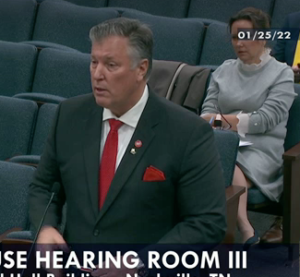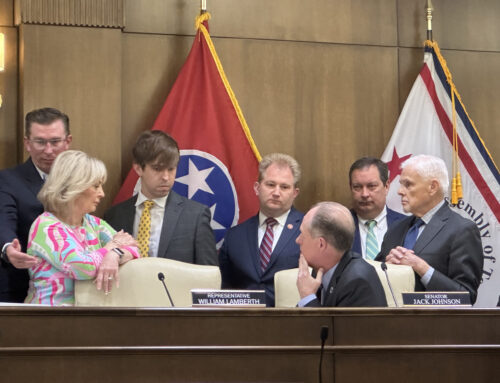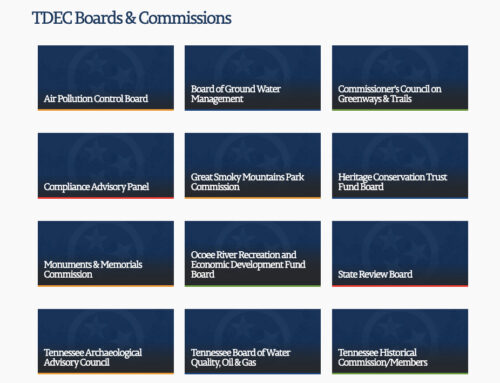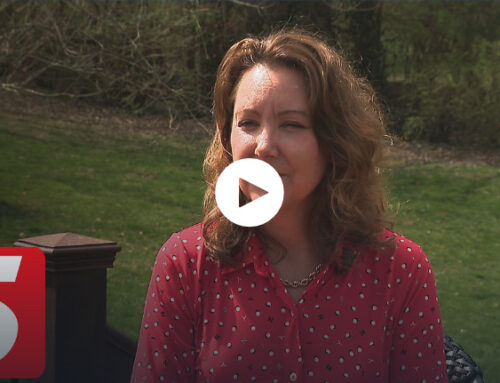A bill that proposed allowing county legislative bodies to satisfy the public notice laws by posting notice of public meetings on a “social media platform” was amended this week in a House subcommittee to remove the mention of social media platforms.

Rep. Scott Cepicky explains his bill that allows county legislative bodies to post notice of special called meetings on their website and other places if they can’t meet the requirement to get an ad in the newspaper five days before the meeting because of a need to take quicker action.
The bill, HB 1677 sponsored by Rep. Scott Cepicky of Maury County, was prompted after the chair of the Maury County Commission complained that a state requirement to publish a notice of a special-called meeting in a newspaper five days before the meeting presented problems when deadlines changed in his local newspaper to get public notice advertisements published.
Maury County Commission Chairman Don Morrow told TCOG that in one case amid the COVID-19 pandemic, the legal requirement which is in Title 5 of state law and specific to county legislative bodies, meant that the county would have had to buy the ad nearly 10 days before a meeting could be held. The meeting was to approve a grant application related to the pandemic, he said, and needed action sooner.
Amendment requires posting to be where the community would become aware of the meeting
The amendment, which rewrites the bill, retains the state law requirement that notice of a special-called meeting of a county commission must be placed in a local newspaper, but allows a county commission that cannot obtain a notice in the newspaper “in a manner timely enough to conduct the necessary business of the special meeting” to meet the following requirements:
- Post the notice in a location where a member of the community can become aware of such notice and on the county’s website if the county has a website;
- Include in the contents of the notice a reasonable description of the purpose of the meeting or action to be taken; and
- Post the notice at a time sufficiently in advance of the special meeting in order to give citizens an opportunity to become aware of and attend the meeting.
TCOG worked with Cepicky on the amendment after expressing concerns that allowing a government entity to post on a social media platform meant that any number of platforms could satisfy the requirement — twitter, Facebook, Snapchat, Instagram. This could be problematic because some people don’t use some or any of those platforms, and it would be too easy for a government entity to post something on a platform that few people in the community even use or a page on a platform that few people follow or watch.
The amendment doesn’t preclude a government entity who can’t meet the deadlines for a newspaper ad to post something on a social media platform, in addition to its own web page, but rather states that the location of the posting must be in a place where members of the community can see it. The language matches a three-prong requirement outlined by the Court of Appeals in 1999 for “adequate notice” of special-called meetings required by the Open Meetings Act and has been judged depending on the facts of the situation. For example, a county legislative body would likely not meet the requirement of the proposed law if it relied on notice on a social media platform that had few viewers or followers from the local community or on a platform or website that is not regularly maintained by the county with regular communications for its citizens.
Sponsor: Does not allow creation of posting location ‘just to skirt around this’
Jerome Moon, R-Maryville and chairman of the House Cities and Counties Subcommittee, said during the hearing that he wanted to make it clear that the amendment language does not mention a social media platform. “We are talking about (the county’s) website, and social media is not being considered at all,” Moon said.
Cepicky agreed and also said that “this does not allow any county to create a website just to skirt around this. Absolutely not. It has to be a website that (citizens) are familiar with, that they can gain access to, and have information easily disseminated back and forth to them. Remember, this is for special-called sessions if (the county) can’t meet the burden of the law to get it in the newspaper on time.”
He noted that Maury County has a website where all public notices and agendas of upcoming meetings are posted.
Cepicky also said the county clerk would still be responsible “for documenting and time-stamping when that (posting) was for future consideration.”
John Crawford, R-Bristol/Kingport asked a question to clarify that the record documenting when and where a posting was made would be filed with the county clerk and available to the public through the county clerk. Cepicky affirmed that this would be the case.
Sen. Joey Hensley, R-Hohenwald, is carrying the legislation in the Senate.
The House bill is scheduled to be heard before the House Local Government Committee at noon Tuesday.




